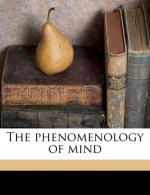
|
| Name: _________________________ | Period: ___________________ |
This test consists of 15 multiple choice questions and 5 short answer questions.
Multiple Choice Questions
1. What in Hegel's view does individuality gain when it finds itself after being lost to the public order?
(a) Eternal life.
(b) Universality.
(c) Conscience.
(d) Historical conciousness.
2. What does Spirit represent for the Mind according to Hegel?
(a) Class consciousness.
(b) Unity with truth.
(c) Historical consciousness.
(d) Unity with the Universal Mind.
3. In Hegel's philosophy, where is duty found?
(a) In relation to Spirit.
(b) In relation to Mind.
(c) In relation to family members and organizations.
(d) In good faith ethics.
4. Where does Hegel look for God in art?
(a) In the social uses of art.
(b) In the underlying laws of art.
(c) In the framework for art.
(d) In the mystical experience of art.
5. According to Hegel, what is the difficulty with self-consciousness manifesting morality?
(a) Self-consciousness can only manifest morality imperfectly.
(b) Self-consciousness has aspects that do not have clear relations with each other.
(c) Self-consciousness cannot manifest morality without enlightenment.
(d) Self-consciousness can only manifest morality in time, never in eternity.
6. What serves as a model for duties for individuals in Hegel's opinion?
(a) Duty within the family.
(b) Duty to the community.
(c) Duty to the spirit.
(d) Duty to one's own education.
7. What term does Hegel use to describe the interrelation of Spirit with events?
(a) Spirit of the Times.
(b) Happenings.
(c) Occasions.
(d) Moments.
8. According to Hegel, what is the element of self-consciousness closest to the Absolute?
(a) Work.
(b) Duty.
(c) Spirit.
(d) Religion.
9. What dictum does Hegel endorse?
(a) Do what you are afraid to do.
(b) Love thy neighbor as thyself.
(c) Know thyself.
(d) Speak only when necessary.
10. What does Hegel say is the highest moral function of an individual?
(a) To understand one's duty.
(b) To recognize the primal importance of duty.
(c) To act correctly upon duty.
(d) To help other people fulfill their duty.
11. What is the center of moral life according to Hegel?
(a) Spirit.
(b) Duty.
(c) Work.
(d) Love.
12. What do contradictory elements lead to according to Hegel?
(a) Dutiful actions.
(b) Self-fulfillment.
(c) Self-awareness.
(d) Hypocrisy.
13. When does the complete spiritual being begin to function in the world according to Hegel?
(a) When the soul begins its work within the self.
(b) When the soul completes its work in society.
(c) When the Absolute is established as a modus operandi.
(d) When the philosopher discovers the Absolute.
14. What emerges after self-estrangement fades according to Hegel?
(a) Enlightenment.
(b) Unity.
(c) A new round of self-conflict.
(d) Divinity.
15. What assumption does Hegel make about God?
(a) That he is human and compassionate.
(b) That he is present.
(c) That he is unreachable.
(d) That he is perfect and timeless.
Short Answer Questions
1. In Hegel's philosophy, what is the relation between property and no property?
2. How does Hegel approach morality?
3. In Hegel's philosophy, what is the self caught between in its early stage?
4. What qualities exist in both "no property" and "property" according to Hegel?
5. According to Hegel, how can absolute freedom be expressed?
|
This section contains 528 words (approx. 2 pages at 300 words per page) |

|




